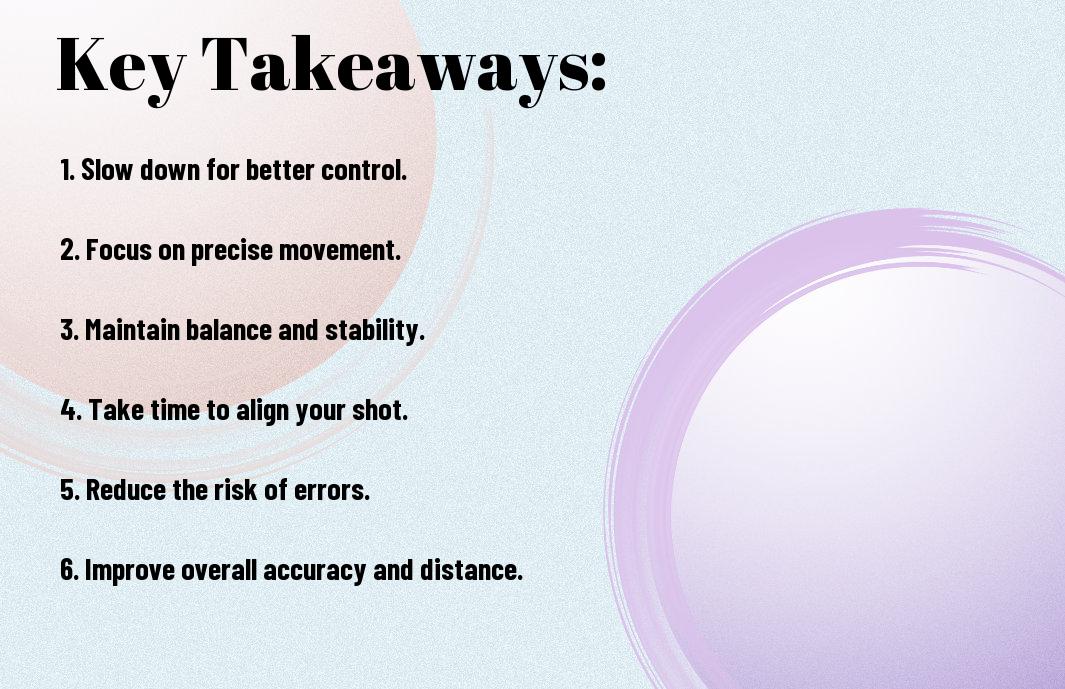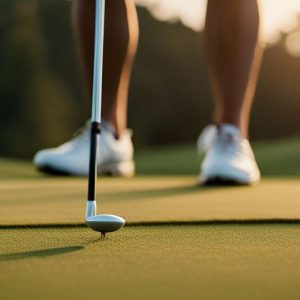Are you struggling to maintain precision in your golf swing? One common mistake that many golfers make is trying to hit the ball with all their might, resulting in an uncontrolled and inaccurate swing. However, by slowing down your golf swing, you can actually improve your accuracy and consistency on the course.
When you slow down your golf swing, you give yourself the opportunity to focus on the proper technique and timing, resulting in more controlled and accurate shots. Additionally, a slower swing can also help prevent injuries that may occur from overexertion. In this blog post, we will discuss the benefits of slowing down your golf swing, as well as provide tips on how to achieve precision on the course. So, if you want to take your golf game to the next level, keep reading to learn how slowing down your swing can make all the difference.
Key Takeaways:
- Precision is paramount: Slowing down your golf swing can help you achieve better precision and accuracy on the course. By focusing on the quality of your swing rather than the speed, you can improve your overall performance.
- Control and consistency: When you slow down your golf swing, you gain better control over the movement of the club and the ball. This can lead to more consistent shots and improved results during gameplay.
- Reduced risk of injury: A slower golf swing puts less strain on your body, reducing the risk of injury and allowing you to play for longer periods without physical discomfort. It also allows you to maintain better form throughout your swing, reducing the likelihood of developing bad habits that can lead to injury.
The Science Behind a Slow Golf Swing
Some people may think that a slow golf swing might result in reduced distance and power. However, the truth is that a slower swing can actually lead to better accuracy and precision. Let’s delve into the science behind a slow golf swing to understand why it’s beneficial for your game.
The Fundamentals of Detailed Swing Mechanics
When you slow down your golf swing, you are able to focus on the fundamentals of your swing mechanics. This includes your grip, posture, alignment, and the path of your club. By taking the time to execute each part of your swing with precision, you can improve your overall performance on the course. Slowing down allows you to identify any flaws in your mechanics and make necessary adjustments, leading to greater consistency in your shots.
Correlation Between Swing Speed and Precision
There is a direct correlation between swing speed and precision. While a faster swing may result in longer shots, it also increases the margin for error. When you slow down your swing, you are better able to control the club and make more accurate contact with the ball. This allows you to place your shots exactly where you want them, rather than relying on sheer power to compensate for lack of control.
Mental Focus and its Role in Swing Precision
Your mental focus plays a crucial role in the precision of your golf swing. When you slow down your swing, you are able to maintain better focus throughout the entire motion. This allows you to visualize your shot, assess the conditions, and make any necessary adjustments before making contact with the ball. By slowing down and staying mentally sharp, you can achieve a level of precision that is difficult to attain with a faster swing.
Evaluating Your Current Swing Speed and Precision
To improve the precision of your golf swing, it is crucial to start by evaluating your current swing speed and the level of precision you currently achieve. By doing so, you can identify areas for improvement and develop a plan to slow down and refine your swing for better results on the course.
Identifying Signs of a Rushed Swing
When assessing your current swing speed and precision, it is essential to look for signs of a rushed swing. One of the most common indicators of a rushed swing is a jerky, hurried movement as you bring the club back and then through the ball. This can lead to inconsistent contact with the ball and a lack of accuracy in your shots. Another sign is a lack of control and balance during your swing, which can result in errant shots that miss the target.
The Impact of Your Current Swing Speed on Game Performance
Your current swing speed directly impacts your game performance. If you are swinging too fast, you may struggle to achieve the precision and control needed to hit the ball where you want it to go. This can lead to frustration and a decrease in confidence in your abilities. Slowing down your swing can help you make more consistent and accurate shots, improving your overall game performance.
Benchmarking Your Precision Level
To gauge your current level of precision, it is important to benchmark your performance. Take note of how often you hit the ball cleanly and accurately, and compare this to the times when your shots are off target. Assessing your precision level can help you understand the areas of your game that need improvement, and serve as a starting point for implementing changes to your swing speed and technique.
Techniques to Slow Down Your Golf Swing
After understanding the importance of slowing down your golf swing, it is time to learn some techniques to help you achieve this goal. By focusing on specific aspects of your swing, you can improve your precision and overall performance on the course.
Focusing On the Backswing
When it comes to slowing down your golf swing, the backswing is a crucial element to focus on. Ensure that your backswing is controlled and deliberate, avoiding any unnecessary haste or force. Take the time to complete your backswing without rushing, allowing your body to coil and set the stage for a smooth and precise downswing. This deliberate approach will help you maintain better control over your swing and improve your overall accuracy.
Mastering the Tempo and Rhythm
Another important technique to slow down your golf swing is to master the tempo and rhythm of your swing. Focus on maintaining a consistent timing and pace throughout your entire swing, from the takeaway to the follow-through. By finding a comfortable and steady rhythm, you can avoid rushing through your swing and improve your ability to make clean contact with the ball. Practice maintaining a smooth and controlled tempo to achieve a more precise and accurate swing.
Importance of a Controlled Downswing
As you work on slowing down your golf swing, it is essential to pay attention to your downswing. Emphasize a smooth and controlled transition from your backswing to the downswing, avoiding any sudden or jerky movements. By maintaining a deliberate and gradual downswing, you can ensure that your clubface is aligned properly at impact, leading to more accurate shots. Practice a controlled downswing to improve the precision of your ball striking.
Balance and Footwork
Do not overlook the role of balance and footwork in slowing down your golf swing. Focus on maintaining a stable and balanced position throughout your entire swing, allowing your body to move fluidly while keeping your feet firmly planted. Pay attention to your weight shift and footwork to ensure a smooth and controlled motion. By prioritizing balance and footwork, you can improve your overall swing stability and precision.
Benefits of Slowing Down Your Golf Swing
Your precision and accuracy on the golf course can significantly improve by slowing down your swing. Let’s explore the various benefits of taking a more measured approach to your swing.
Improved Accuracy and Control
By slowing down your golf swing, you can greatly improve your accuracy and control over the ball. A slower swing allows you to focus on the mechanics of your swing, ensuring that each movement is executed with precision. This can result in more consistent shots, as you are better able to make proper contact with the ball. Additionally, a slower swing can help you avoid overcompensating for errors, leading to a more controlled and accurate shot.
Lowering Your Handicap
Slowing down your golf swing can also lead to a reduction in your handicap. When you are able to consistently hit the ball with accuracy, you are more likely to produce lower scores. A slower swing allows you to make deliberate and calculated movements, resulting in more consistent play. Lowering your handicap can also lead to a more enjoyable golfing experience, as you will be more competitive and satisfied with your performance on the course.
Avoiding Common Golfing Mistakes akin to Quick Swing
By taking the time to slow down your golf swing, you can avoid common mistakes often associated with a quick swing. Rushing your swing can lead to a loss of control and accuracy, resulting in errant shots and frustration on the course. Slowing down your swing allows you to maintain proper form and technique, reducing the likelihood of making these common errors. This can ultimately lead to a more enjoyable and successful golfing experience.
Implementing Changes for A Better Golf Swing
Lastly, now that you understand the importance of slowing down your golf swing for improved precision, it’s time to learn how to implement these changes in your game. Making a gradual transition to a slower swing can be a challenging process, but with the right approach and mindset, you can achieve significant improvement in your overall performance on the course.
Step-by-Step Guide for Gradual Transition
When it comes to making changes to your golf swing, it’s important to take a gradual approach. Rushing the process can lead to frustration and potential injury. Here’s a step-by-step guide to help you make a smooth transition to a slower swing:
| Step 1: | Start by practicing your swing at a slower pace on the driving range. Focus on maintaining control and balance throughout the entire motion. |
| Step 2: | Work with a golf instructor to analyze your current swing mechanics and identify areas where you can make adjustments to slow down your swing without sacrificing power. |
Dealing with the Challenges of Slowing Down Your Swing
Transitioning to a slower golf swing can present several challenges, including feeling uncomfortable and losing distance initially. However, it’s important to stay patient and remain committed to the process. Keep in mind that slowing down your swing is a long-term investment in your game, and the benefits will become apparent with time and practice.
Monitoring Your Progress
As you work on slowing down your golf swing, it’s crucial to monitor your progress regularly. Keep track of your performance on the course, as well as your practice sessions. Pay attention to how your accuracy and consistency improve over time as a result of making this change. Celebrate the small victories and use them as motivation to continue refining your new, slower swing.
Case Studies of Master Golfers with Slow Swings
Despite the common misconception that power comes from a fast swing, several of the greatest golfers in history have achieved remarkable success with slow, deliberate swings. Here are three case studies of master golfers whose slow swings have defied conventional wisdom:
- 1. Ben Hogan: Known for his methodical swing, Hogan won 64 PGA Tour events and nine major championships with a swing so slow that it was often described as “graceful.”
- 2. Ernie Els: The “Big Easy” is renowned for his smooth, unhurried swing, which has helped him secure four major titles and over 70 professional wins.
- 3. Fred Couples: With a languid tempo and effortless power, Couples has enjoyed consistent success on the PGA Tour, winning the 1992 Masters and numerous other tournaments.
How the Pros Utilize Slow Swings
When you watch these master golfers in action, you can see how they skillfully utilize their slow swings to achieve precision and control. By maintaining a deliberate tempo, they are able to stay in sync and maintain a smooth, consistent rhythm throughout their entire swing. This allows for maximum power and accuracy as they strike the ball.
Specific Techniques from Top Golfers
One key technique employed by these top golfers is the full body rotation and the utilization of core power. By focusing on engaging their core muscles and initiating the swing from their hips, they are able to generate incredible power and maintain control, despite their slow and deliberate tempo.
Analysis of Swing Speed and Success in Professional Golf
Research has shown that swing speed alone does not dictate success in professional golf. In fact, a slower, more controlled swing can lead to greater accuracy and consistency on the golf course, ultimately leading to lower scores and more victories. This challenges the traditional belief that faster swing speeds are always better.

To wrap up
Remember, when it comes to achieving precision in your golf swing, it’s essential to slow down and focus on your technique. By taking the time to control your swing and ensure proper alignment, you can significantly improve your accuracy and consistency on the course. To learn more about the benefits of slowing down your golf swing and how it can help you produce straighter shots, check out this helpful article on how to slow down your golf swing to produce straighter.
FAQ
Q: Why is it important to achieve precision in your golf swing?
A: Achieving precision in your golf swing is crucial for consistently hitting the ball where you intend. It allows for better control and accuracy, resulting in improved overall performance on the course. Slow down your swing, focus on proper technique, and you will see improved precision in your shots.
Q: How does slowing down my golf swing help me achieve precision?
A: Slowing down your golf swing allows for better control and increased muscle memory. By taking the time to focus on your mechanics and form, you can ensure that each movement is precise and deliberate. This ultimately translates to more accurate and consistent shots on the course.
Q: What are some tips for slowing down my golf swing and improving precision?
A: To slow down your golf swing and improve precision, focus on maintaining a smooth tempo throughout your entire swing. Take practice swings at a slower pace, concentrating on your posture, grip, and alignment. Additionally, consider using training aids or seeking guidance from a professional to fine-tune your technique and achieve better precision in your golf game.
Hey, I'm Maxwell Fairway, a name that's been echoing on golf courses for over a decade. Golf has been my driving force, propelling me through the world of fairways and greens since my early days. With each swing, I've crafted my skills, refined my approach, and gained invaluable wisdom about this captivating sport.






